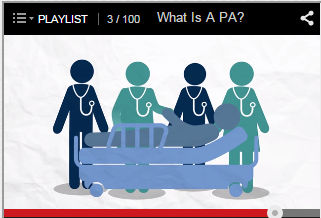 Today has been a landmark day in Australian health, particularly for rural and regional areas, with the country’s first graduation of a cohort of bachelor degree trained physician assistants from James Cook University.
Today has been a landmark day in Australian health, particularly for rural and regional areas, with the country’s first graduation of a cohort of bachelor degree trained physician assistants from James Cook University.
Croakey has published a number of reports – see this one and the links below – on the benefits of physician assistants, and the barriers that have been put up in the past to their emergence in Australia.
As this interview on Radio National Breakfast explained today, physicians assistants are medical professionals who work with and under doctors, and they could be the key to making Australia’s health system more efficient and affordable.
In the broadcast, Richard Murray, Dean of Medicine and Dentistry at James Cook says the US has more physician assistants than Australia has doctors, and says trials here have shown great promise.
Stephen Duckett, Director of the Health Program at Grattan Institute, told the graduation ceremony today that physician assistants are a proven way to expand access to care, but the initiative has to go beyond Queensland.
Below are extracts from his speech (read the full speech here) or you can read his article from The Conversation.
The first Physician Assistant graduates number only four; all are mature age students who came to the program with diverse health backgrounds, the university said.
Physician assistants practice medicine under the direct supervision of a doctor. Their role is agreed with the supervising doctor, and can develop over time along with trust, experience and training. They have been shown to provide high quality care. This means that GPs can delegate any kind of care to physician assistants.
Physician assistants are an established part of the health care team in several countries, but implementation in Australia is hampered by multiple veto points between an idea and its implementation.
To be fully effective, introduction of physician assistants to rural and remote
Australia needs coordinated action by the Commonwealth and state governments.
In what I think is a good move, Queensland this year has ‘gone it alone’ and changed its rules to allow physician assistants to prescribe, refer to medical specialists or order diagnostic tests within the Queensland public health system.
Similarly, this University has gone it alone in introducing a Bachelor’s degree program for physician assistants.
But the full potential of these changes will only be reached if the Commonwealth recognises physician assistant prescriptions, tests and referrals under the Pharmaceutical Benefits (PBS) and Medicare Benefits Schemes (MBS).
Without Commonwealth recognition under the PBS, patients outside hospitals have to pay more for medication prescribed by a physician assistant.
The graduation today shows that physician assistants are now clearly part of the fabric of the health system in Australia. It is about time that the Commonwealth and states caught up with changes in practice, and changes in the health team, and removed barriers to using physician assistants to their full potential, for the benefits of patients and communities.
Another way in which we need to think and act differently is using pharmacists’ skills better. In a report Grattan Institute issued last year, we argued that a good way to address the access problem in rural Australia was to use pharmacists’ skills better including immunising.
I’m pleased to say the Queensland government has picked up on that suggestion. We went further though and proposed that with the agreement of GPs and patients, pharmacists should be able to provide repeat prescriptions to people with simple, stable conditions. They should also be able to provide vaccinations and to work with GPs to help patients manage chronic conditions. Using pharmacists in this way frees up scarce doctor time to allow them to treat more complex conditions.
Read more from Croakey’s archives about the benefits and barriers to the role:
• Health Workforce Australia report highlights the demand for PAs
• Physician assistants win support of rural and remote doctors
• Professor Peter Brooks on why Australia needs PAs
Image (top, left) sourced from an info video produced by the American Academy of Physician Assistants https://www.aapa.org/
